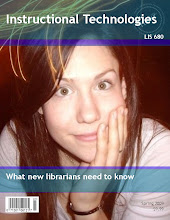Every word I write now has a place in history.
Or might.
Right?
I have trouble wrapping my mind around the notion that the trail I'm leaving behind won't disintegrate in time. That might be because I think no one can possible care, what with all the info out there. What have I to offer?
Whenever I think of how potentially catastrophic it might be for someone to happen upon--intentionally, rather than accidentally--past ramblings of mine, rotting in shambles--I imagine that I am running for office of some kind, and that incriminatory quotes from my long forgotten past will splash the front pages of the world's papers. But I never intend to run for office. I haven't done anything tooooo racy, either. It's an irrational fear.
Right?
I do worry about my writing not being my best, or too cheesy, or immature... But here's what I worry should really worry me: "It occurs to me that such warning systems can easily be turned on their heads, and become a kind of automated data detective. How long before such programs are circulated online to help people learn the secrets of others?" (http://www.newscientist.com/blogs/shortsharpscience/2009/01/what-your-social-network-can-r.html)
What secrets do I have to keep? Identity theft isn't new (or, as I mentioned in a previous email, necessarily possible to prevent, I've decided to accept). Exposing a teacher for a loony--or even an irresponsible twenty something--is, though. To me. But my identities are pretty consistent, I think.
That saiiiiiiiiid... I don't necessarily want my students having access to my full identity, consistent or no. Why? It complicates things. Not befriending students is something I can control.
On the other hand... Two (male) students asked to take a picture of me dressed up for Spirit Week one day last week. No problem; I like the two students a lot. As soon as it was taken, though, one said, "A picture with Ms. Daehler! This is going to be allllll over facebook!" It wasn't a compromising picture by any stretch of the imagination, but exposure beyond my control to an audience who might actually care about the photo had me feeling suddenly nervous.
I shook it off. It's a new age. Pictures are taken and shared everywhere by everyone. A posted picture does not steal my soul. It might embarrass me. But that's the worst it gets. Right?
As far was what Dubbles refers to here as "the big three," this is where I stand:
- MySpace: No presence (though I did sign up for a secret account years ago to see a friend's posted photos)
- Facebook: Active, but never "active enough"; now double active with my two facedness (though neither is not me!). I am hesitant to invest in a second account--and I feel a little sketchy doing so--but I am MOST worried about how befriending students--even former students--might complicate my life! My prinicipal, I believe, would be against it. No matter how positive Cindy Long speaks of Facebook's potential, I don't know that the benefits of connecting to students through this means, at this time, outweigh the very real, very pregnant with danger drawbacks.
PLUS, there's the whole issue of Facebook being blocked at work. For better? For worse? As mentioned in a previous post, I receive email notifications of people's direct contact with me, which is really why I'm on Facebook (as opposed to the stalk-options. Hehe. I'm sure that term's been used before, but it's new to me :).
- LinkedIn: Passive, but on there. I created an account after three former co-workers invited me to join. Since then, I've yet to jump on the offensive, though I do see the value, particularly if I were to be in the market for a job. I'm pictureless on LinkedIn, and for some reason, that says something.
I don't twitter (but Facebook is apparently becoming my twitterish). I still strive to be less connected.
I wonder what the next thing will be, and how it will connect and disconnect me, and how all that will affect my lifestyle and mood. And identity.
Other reading notes:
- Also from Cindy Long re. ACTIVE participation: "An active community is key, because social networks are only as good as the conversations that take place within them, says Hargadon of Classroom 2.0."
- Great list of social networks for educators there, too! Pass along to MVA teachers
From Facebook Rules:
- Backlash to a feature that many argued threatened privacy... but then vindication when the feature became standard, but optional: "And he has been vindicated: hardly anyone opted out, and today the news feed is one of Facebook’s most widely-used features. I bring this up to illustrate that no one — neither Facebook, nor its users, nor the Internet’s chattering classes — knows exactly what features and policies a social networking site should have." We don't know what we want yet!
- Bottom line: "THERE CAN BE NO LEARNING WITHOUT EXPERIMENTATION"!
- The challenge is to walk the fine line: "As a Facebook user, I want Facebook to be experimenting with new features and policies, because some of them will make my Facebook experience better. I also want Facebook to listen to users and respond to their concerns. But I wouldn’t want Facebook to become so afraid of user backlash that it stops experimenting altogether."
- How much help do we need/accept to help forge an identity? Our identities?
- "Facebook has always been an incredibly supportive tool for young artists as they forge their identities, work and careers."
- when will law catch up? who owns what? who cares?
- gooooooo. when you put it like this: "the site is tracking your every keystroke" Scary.
- interoperability patterns are reallllllly interesting to me. So many parallels to human behavior! Who sets the trends? who opens up to whom? or what? and why? motives, responses, implications... fascinating.
Monday, March 23, 2009
Subscribe to:
Post Comments (Atom)

No comments:
Post a Comment